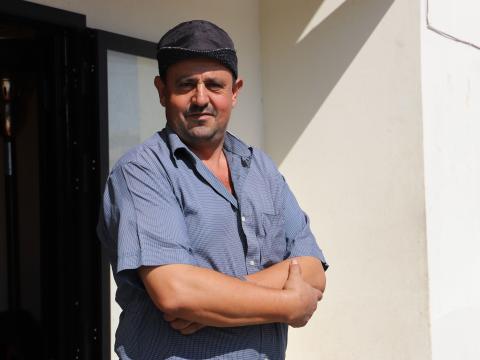Fathers in crisis find Hope

Syrian refugee families in Lebanon struggle to make ends meet. Fathers, specifically, wake up every day with one thought in mind: providing for their families. Mhammad and Chaib participated in the ‘Cash for Work through Farmer Managed Natural Regeneration, a specialized World Vision project model, where they contributed to the restoration and improvement of select range-lands in Akkar, North Lebanon.
With funds from EO Metterdaad, the project aims to provide monthly income opportunities to 197 vulnerable Syrian refugees and 177 Lebanese in return for their work, as well as theoretical and practical training sessions on pruning trees and the conservation of forests. The monthly income received by beneficiaries serves as a safety net for their households to meet their basic needs.
New books and clothes for the children’s school year!
June 6, 2012, is a date engraved in Muhammad's memory. The 46-year-old Syrian man had to save his family from the dreadful war. He fled his town Kalaat el Hosn to Lebanon, immediately, to provide his wife and children with a safe and peaceful life. His main concern was and still is, that his children receive a proper education. He cannot bear the thought of being a neglecting father, one who deprived his kids the privilege of education. "Would my children ever forgive me if I fail to educate them?” asks Mohamad with concern. "I am the one who decided to leave Syria and come here, and therefore I am responsible for my decision. Education is their weapon. Imagine a kid who did not have the chance to learn to read or write. What will his fate be?"
Mhammad is among the 197 Syrian refugees who participated in the FMNR project, funded by EO Metterdaad and implemented by World Vision. Mhammad received 396 USD in return for 22 working days over four months. This amount of money was a source of relief for Mhammad, mainly because the school year was about to start. "I was able to buy my children the necessary books, uniform, even new sneakers and stationary,” he says joyfully. "My family and I are thankful for this opportunity. This project helped me solve a lot of problems from school payments to school supplies."
Generating income was not the only factor that brought comfort to Muhammad's heart. He enjoyed being around the people taking part in the project. “The project supervisors were very thoughtful. They never pushed anyone to overwork, particularly during the hot summer days”, he recalls. "No one disturbed us while working. Honestly, it could not get any better than this.” The lessons acquired as part of the project training widened Muhammad's knowledge in the pruning of some crops.
"Most of us come from villages, and we are used to agriculture, harvesting and planting,” he admits. "But the sessions provided us with additional information, new techniques, some facts such as not all trees will grow back after cutting them."
Winterization is no longer a worry
After living with his wife and children in a basement in the outskirts of Beirut for five years in return for his work as a janitor in a building, 60-year-old Chaib landed his first income opportunity with the Farmer Managed Natural Regeneration project in Akkar. Chaib and his family escaped the war in Syria, six years ago. He took this defining decision when several bombings hurt his children. His eldest fled to Turkey, the middle son became partly deaf, the third child was severely distressed, and his youngest passed away.
Life near the city was expensive, so Chaib and his family moved North and resided in Akkar. At first, it was not easy. He could not pay rent, and the only income he had was the small amount of money that his eldest sent him from abroad.
When he heard about the project, Chaib was thrilled to sign up but felt homesick. Back in Syria, he had a big land where he worked in planting crops. "I inherited 1020 olive trees from my father, but they were all burned down during the war. They are all gone,” he recalls regretfully.
"I am planning on using the money to cover rent and cumulated debts for all the months I was not able to pay, and what is left of it, I will spend it on heating means for winter,” he admits. Chaib received 396 USD in return for 22 working days over four months as well.
Stories of fathers like Mhammad and Chaib are common among refugees in Lebanon. Providing for their families is their primary concern, as well as their children's education and other health essentials and priorities. Fathers often find themselves in a never-ending dilemma; however, initiatives such as the Farmer Managed Natural Regeneration project bring back hope and comfort into their lives.